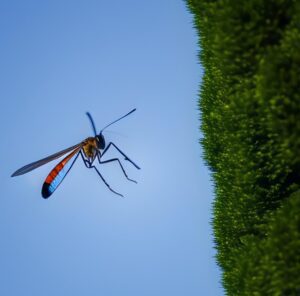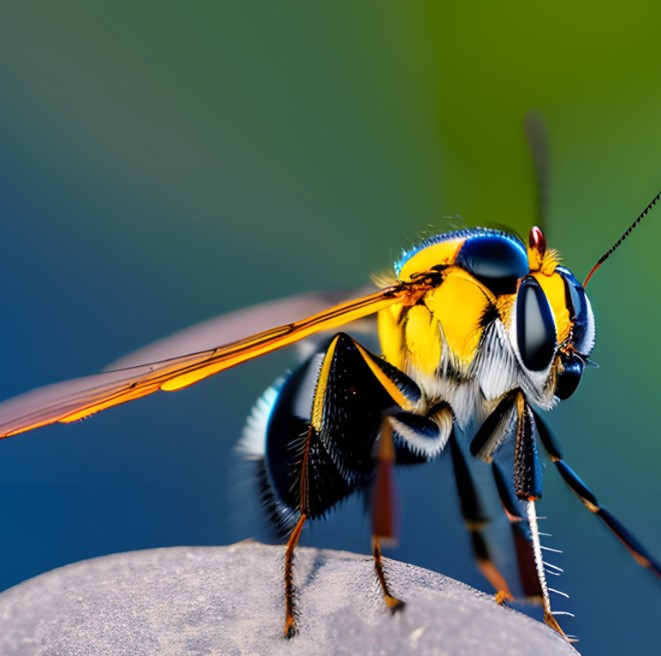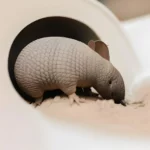Have you ever wondered if mosquitoes can see in the dark? Mosquitoes are pesky insects that buzz around and bite us, leaving itchy bumps on our skin. But do they have any special abilities when it comes to seeing at night?
Scientists have been studying mosquitoes for a long time and have found some interesting things about their eyes. In this article, we will explore whether mosquitoes can see in the dark and how they use their eyes to find their next meal. So sit back, grab a bug spray (just in case), and let’s learn more about these fascinating creatures!
The Anatomy Of A Mosquito’s Eye
Mosquitoes have compound eyes composed of thousands of tiny units called ommatidia. These ommatidia work together to enable the mosquito to see its surroundings. The arrangement of these ommatidia allows mosquitoes to perceive movement and changes in light levels.
The number of ommatidia in a mosquito’s eye varies depending on the species, but they generally have between 100-200 ommatidia per eye. This allows them to detect changes in light and dark environments quickly. However, despite their keen sense of sight, mosquitoes can only see a little in complete darkness.
Even though mosquitoes can’t see in total darkness, they can still navigate through dimly lit areas using other senses, such as smell and touch. Mosquitoes use sensory receptors around their antennae and mouthparts to help them find their prey or locate potential breeding sites. The following section will explore how mosquitoes detect and use light for survival.
How Mosquitoes Detect Light
As we learned in the previous section, a mosquito’s eye comprises several parts that work together to help it see. But can mosquitoes see in the dark? The answer is no – they need light to be able to see.
Mosquitoes have specialized cells called photoreceptors that detect changes in light levels. These cells are located in their eyes and are sensitive to different wavelengths of light. When enough light is present, these cells send signals to the mosquito’s brain, allowing it to process visual information.
However, mosquitoes also have circadian rhythm control, affecting their activity levels throughout the day and night. During certain times of day or night, mosquitoes may be more active than others, depending on their internal clock. This means that while they may not be able to see well in complete darkness, they can still move around and find food sources when necessary.
The Role Of Vision In Mosquito Behavior
Have you ever watched a mosquito flying around your room at night? They seem to zip and zoom with ease, even in total darkness. But can they see in the dark? Mosquitoes are most active during the evening and night, so their vision plays a vital role in their behavior.
While mosquitoes have eyes similar to human eyes, their visual cues work differently than ours. Instead of relying on light as we do, mosquitoes use other senses, such as smell and heat detection, to locate their prey. However, they still need some level of vision for navigation purposes.
At night, mosquitoes rely on adaptations for nighttime navigation, such as using moonlight or starlight to guide them. Research has also shown that they can detect differences in brightness levels between objects, allowing them to navigate through shadows and low-light environments. With these unique abilities, it’s no wonder why mosquitoes are such successful hunters, even when visibility is poor!

Adaptations For Nighttime Navigation
Mosquitoes have some incredible adaptations for navigating at night! They can detect even the slightest bit of light and find their way around. They also have a great sense of smell, so they can sniff out their food even when it’s dark outside. They also beat their wings differently at night. It’s faster than when they fly during the day, so they don’t get lost in the dark. Nighttime navigation is a cinch for mosquitoes!
Light Sensitivity
Have you ever wondered how mosquitoes navigate in the dark? Well, they have some unique adaptations for nighttime navigation. One of these is their light sensitivity. Mosquitoes can detect even the tiniest changes in light, which helps them fly toward areas where there might be a host.
This ability is due to a part of their body called the compound eye. The compound eye contains many individual lenses, each with its photoreceptor cell. These cells allow mosquitoes to see different brightness levels and help them adjust to changing light conditions throughout the day and night. This also plays a vital role in their circadian rhythm, which regulates their behavior based on the time of day.
Overall, mosquitoes’ light sensitivity is just one of many fascinating adaptations they use for nighttime navigation. Using this skill and others such as odor detection and heat sensing, they can locate potential hosts even when it’s pitch black outside!
Olfactory Sensitivity
Now that we’ve talked about mosquitoes’ light sensitivity and how they use it to navigate the dark, let’s move on to another adaptation: their olfactory sensitivity. Olfactory sensitivity refers to their sense of smell, essential for finding a host. Mosquitoes can detect carbon dioxide (CO2) from potential hosts up to 100 feet away!
When humans breathe out, we release CO2 into the air. This is why mosquitoes are often drawn toward people or animals when they exhale. But it’s not just CO2 that attracts them – mosquitoes can also detect other chemicals in our breath and skin odor that make us more attractive as hosts.
This ability is due to specialized receptors located on the mosquito’s antennae. These receptors allow them to pick up on specific odors and determine whether or not a potential host is nearby. By combining their olfactory and light sensitivity, mosquitoes can locate and target hosts even under darkness!
Wingbeat Frequency
Now that we know how mosquitoes use their sense of smell and light sensitivity to navigate in the dark let’s talk about another exciting adaptation they have: wingbeat frequency. Mosquitoes’ wings beat at a specific rate, depending on temperature and evolutionary history.
The frequency at which a mosquito beats its wings affects its ability to fly and maneuver through the air. For example, when temperatures are more relaxed, mosquitoes must flap their wings faster to generate enough lift to stay airborne. This is because the cool air is denser than warm air, making it harder for insects with tiny bodies, like mosquitoes, to take flight.
Interestingly, researchers have found that different species of mosquitoes have evolved unique wingbeat frequencies over time. These differences may allow them to better adapt to their environments or avoid competition with other species for resources. Understanding how mosquitoes’ wingbeat frequency changes under different conditions can give us insight into how these pests survive and thrive in various habitats.
The Limits Of Mosquito Vision
Mosquitoes have evolved into seeing in low light conditions, but their visual acuity is limited. They can detect movement and shapes but cannot distinguish fine details or colors.
Their evolutionary history has led them to rely heavily on other senses, such as smell and heat detection when seeking out prey. However, vision still plays a vital role in their hunting strategies, especially during the dusk and dawn hours when visibility is reduced.
While mosquitoes may not have the sharpest vision compared to other animals, it is still a crucial part of their survival. Understanding the limits of mosquito vision can help researchers develop more effective methods for controlling these disease-carrying insects.
Comparing Mosquito Vision To Human Vision
Imagine a world where you could see colors that no one else could. That’s what it is like for mosquitoes, whose eyes have evolved to detect a broader range of colors than humans. While humans can see about 1 million shades and hues, mosquitoes can distinguish between more than 100 million!
However, human vision has the upper hand when it comes to sensitivity. Mosquitoes have poor visual acuity and rely primarily on their sense of smell to locate prey. They use their eyes mainly to detect movement in low-light conditions.
Here are three key ways mosquito vision differs from a human vision:
- Mosquitoes have compound eyes of thousands of tiny lenses, allowing them to see objects as a mosaic rather than a clear image.
- Unlike humans, who have three types of color receptors (red, green, and blue), mosquitoes have six or more that enables them to perceive ultraviolet light and other wavelengths invisible to us.
- Mosquitoes cannot focus on objects at different distances as we do; instead, they must move closer or farther away until an object comes into view.
These differences in vision have important implications for mosquito control. Scientists can develop new strategies for trapping and repelling these disease-carrying insects by understanding how mosquitoes see the world around them.

Implications For Mosquito Control
Knowing whether mosquitoes can see in the dark is crucial for mosquito control. If they can see well, spraying insecticides during the day might be less effective at reducing their population. However, if they cannot see well in low light conditions, it may be necessary to focus on controlling them during nighttime hours.
One way that scientists are exploring controlling mosquito populations is through genetic modification. By altering specific genes within a mosquito’s DNA, researchers aim to create mosquitoes that cannot transmit diseases like malaria or dengue fever. This method has shown promise in laboratory settings, but there are concerns about potential environmental factors and unintended consequences of releasing genetically modified mosquitoes into the wild.
Another mosquito control approach is targeting breeding sites where female mosquitoes lay their eggs. Removing stagnant water sources such as standing pools or containers with still water can prevent mosquito larvae from developing into adults. Additionally, using larvicides or biological agents like Bacillus thuringiensis (Bt) can kill mosquito larvae before they have a chance to mature.
Future research directions should focus on finding more environmentally-friendly ways of controlling mosquito populations without negatively impacting other organisms in the ecosystem. It will also be essential to continue studying how environmental factors like temperature and humidity affect mosquito behavior to develop more effective strategies for controlling these disease-carrying insects.
Future Research Directions
So far, we have learned that mosquitoes can see in low light conditions but not in complete darkness. However, there is still much more to discover about their visual abilities and behavior. This section will explore potential collaborations and funding opportunities for future research on mosquito vision.
One exciting collaboration area could be with researchers studying the genetics of mosquitoes. By identifying genes related to vision, we may better understand how these insects navigate through different environments, including dark spaces. Additionally, interdisciplinary partnerships between entomologists, ecologists, and engineers could lead to innovative technologies for monitoring mosquito populations and controlling their spread.
Obtaining funding for mosquito vision research may require creative approaches such as partnering with public health organizations or seeking grants from foundations dedicated to disease prevention. Crowdfunding campaigns also help raise awareness and support among the general public. With continued investment in scientific inquiry, we may uncover new insights into mosquito biology that ultimately benefit human health and well-being.
Frequently Asked Questions
What Is The Average Lifespan Of A Mosquito?
Mosquitoes have a short lifespan compared to other insects. On average, they only live for about two weeks! But during that time, they can mate and lay hundreds of eggs. Their mating habits are affected by environmental factors, like temperature and humidity. Mosquitoes need warm, humid weather to thrive and reproduce. Those conditions are necessary for their numbers to increase. Even though mosquitoes don’t live very long, they can still be nuisances and spread diseases like malaria or Zika.
Do All Mosquito Species Have The Same Visual Abilities?
Not all mosquito species have the same visual abilities. Mosquitoes have evolved different eye structures and color receptors to adapt to their specific environments. Some mosquitoes, like those that live in dark areas, have better night vision than others. Visual differences between mosquito species can also affect their behavior and mating habits. So while some may be able to see well in low light, not all mosquitoes share this evolutionary adaptation.
Can Mosquitoes See Colors, or Only See In Black And White?
Mosquitoes can see some colors, but not all of them. They have a type of color vision called dichromatic vision, which means they only have two kinds of color receptors in their eyes. This allows them to see colors like blue and green, but they cannot distinguish between red and green. Additionally, mosquitoes are sensitive to ultraviolet (UV) light, which humans cannot see. This helps them locate food sources, such as flowers or warm-blooded animals.
How Do Mosquitoes Locate Their Prey, Aside From Using Their Vision?
Mosquitoes use more than just their eyes to find their next meal. They have a unique ability called chemical senses which allows them to detect the carbon dioxide and other chemicals in our breath that we exhale when we breathe. This helps them locate us even in complete darkness! Mosquitoes can also sense heat from our bodies using tiny sensors on their antennae. So even if it’s pitch black outside, they’ll still be able to find us by following our scent and tracking our body heat. That’s how those pesky bugs always seem to know where we are!
Are There Any Natural Predators Of Mosquitoes That Rely On Their Poor Eyesight To Catch Them?
Some animals are natural predators of mosquitoes, like birds and bats. They rely on a mosquito’s vibrations when flying to locate them rather than their poor eyesight. This evolutionary adaptation helps them catch their prey even in the dark. Predator-prey dynamics are essential, ensuring each species can survive and thrive.
Conclusion
So, can mosquitoes see in the dark? Well, not all mosquito species have the same visual abilities. Some mosquitoes can see in low light conditions and even in total darkness! But how do they do it?
Scientists believe that these particular mosquitoes have adapted their eyes to be more sensitive to light, allowing them to navigate through the darkness in search of prey. However, other species may rely on other senses, such as smell or body heat detection, to find their next meal.
It’s important to remember that even though mosquitoes might have excellent vision, they still play an essential role in many ecosystems as a food source for predators like bats and birds. So while we may not love getting bitten by them, let’s try to appreciate these little creatures for what they bring to the natural world.

